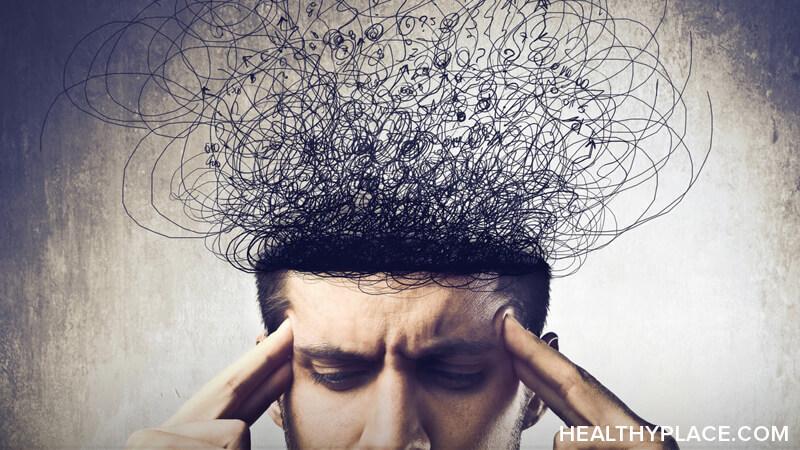What Is Anxiety-Related Brain Fog? Begin Regaining Your Mind

Anxiety-related brain fog is an annoying effect of anxiety that can be exhausting, frustrating, and downright discouraging. With anxiety, brain fog is mental exhaustion that spreads through our whole being and seeps in between anxious thoughts, seeming to blunt all thoughts but those pesky, anxious ones. It can be difficult to work our way out of brain fog because it turns thinking and problem-solving into a gargantuan task. Even when motivated to clear it, it's hard to know where to start. Read on for more on anxiety-induced brain fog and how to emerge from it.
What Is Anxiety-Related Brain Fog Like?
Brain fog isn't a medical or mental health diagnosis, but it is a very real experience involving the way we think and how we feel physically and emotionally. Because it can be associated with many different conditions, including but by no means limited to anxiety, depression, diabetes, certain autoimmune disorders, and medication side effects, it's important to visit with your doctor to rule out other possible causes of mental exhaustion.
Just as with anxiety, everyone's experience with brain fog is unique. In general, brain fog creates experiences like:
- Difficulty concentrating -- You might be reading an enjoyable, lighthearted book but not truly be enjoying the experience. You've been reading the same paragraph for 20 minutes, and you still don't know what you've read.
- Forgetfulness -- Perhaps you're standing in an aisle in the grocery store staring at both your list and the array of products on the shelf that all seem to blend together but still can't figure out what you're supposed to buy.
- Exhaustion -- Even after a decent night's sleep, your body feels heavy and your mind lethargic as if you're trying to swim through a vast pool filled with pudding skin.
- Mental disorganization -- Even if you're making the cookies you've made 100s of times in your life and have all the ingredients and supplies laid out neatly in front of you (put there by someone other than you because, with brain fog, it's hard to plan and be efficient like that), you stare at it and simply don't know how or where to start.
- Communication struggles -- Communication is a two-way street, but you're not even on a gravel path leading to that street. You have a hard time following what someone is saying, and you struggle to come up with things to say.
- Diminished productivity -- Despite trying to work at something, you feel like you're not getting anything done.
These are just some possible consequences of brain fog. By itself, brain fog is challenging but add anxiety to the mix, and your experiences can be exasperating. In addition to the physical and mental symptoms of brain fog, pile on your symptoms of anxiety and the situation can feel impossible. In anxiety-related brain fog, we struggle with the above experiences while simultaneously dealing with:
- Racing, anxious thoughts -- Anxious thoughts seem to be the only things within us that have the energy or desire to move.
- Worst-case scenarios -- Anxiety adds an annoying layer to brain fog by causing us to imagine all sorts of terrible consequences that will happen because of this state of fogginess.
- An inability to relax -- Perhaps you've experienced being tired and wired because of anxiety. Brain fog amplifies this effect of anxiety so that we're more wiped-out than ever, but we can't get the rest our brain and body crave. We're too keyed-up with worries and the automatic negative thoughts associated with anxiety.
Because of the nature of anxiety-related brain fog, it often grows and envelops us. It's hard to think and know what to do about it. Rest assured, though, there are ways to clear brain fog and reduce anxiety at the same time.
How to Emerge from Brain Fog Caused by Anxiety
Chances are, the experience of this anxiety-induced brain fog increases your anxiety. With increased anxiety, brain fog grows denser and harder to navigate. Anxiety bumps up in response, and this becomes a nasty, self-perpetuating cycle. It's tempting to grow upset with ourselves for it. Berating myself for it was always my initial go-to reaction and main method of dealing with it. This approach never worked for me. This reaction, while ineffective, has a positive side. It offers us a great starting point for emerging from anxiety-related brain fog: acceptance and nonjudgment.
Accepting our experience with brain fog may seem counterintuitive. Why in the world would we want to accept this life-limiting experience? Acceptance, a key component of acceptance and commitment therapy, doesn't mean resigning ourselves to something unsatisfactory or giving up; instead, acceptance means letting go of the struggle. When we can acknowledge both brain fog and anxiety and accept that they're a current part of our life without judging them negatively or beating ourselves up for experiencing them, we free ourselves. We become unattached, unstuck.
At this point, we still feel anxious and brain-foggy. However, we can now wiggle a bit. We can shift our focus and take intentional, positive action to reduce both anxiety and related brain fog. Come back next week to discover 12 practical tips for helping anxiety-related brain fog.
APA Reference
Peterson, T.
(2021, January 21). What Is Anxiety-Related Brain Fog? Begin Regaining Your Mind, HealthyPlace. Retrieved
on 2025, December 31 from https://www.healthyplace.com/blogs/anxiety-schmanxiety/2021/1/what-is-anxiety-related-brain-fog-begin-regaining-your-mind